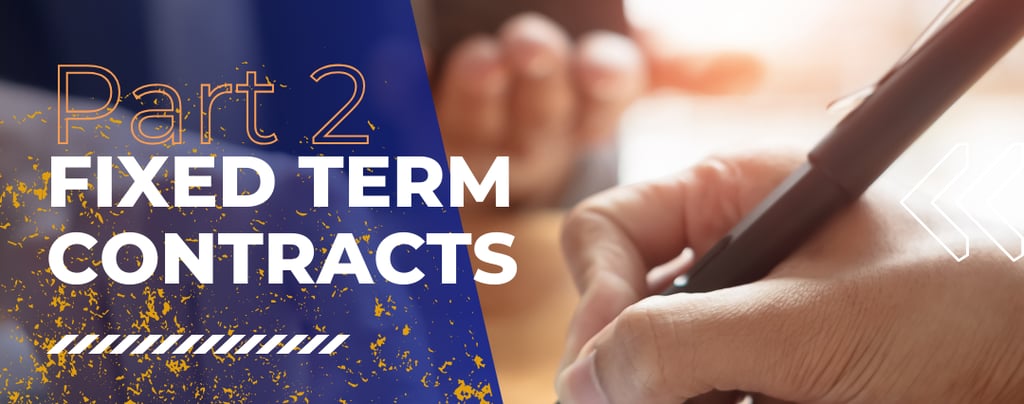Fixed Term Contracting in Sports (Pt 2)
Late last year, new legislation came into effect that will change the face of sports in Australia. In Part 2, I explore the longer term impacts on Australian sport that may follow from these changes.
1/23/20254 min read


I preface this by saying that while I am qualified and practicing as a lawyer, I don't work in sports law. I do work in employment law, and the following post is a reflection of my insights from that knowledge. It is not legal advice, and is general commentary. Anyone concerned about the potential personal legal or professional implications should seek specific, personal legal advice from a legal advisor.
Last week I recapped the headlines of the recent changes to legislation affecting Fixed Term Contracts in Australia. To read more, click here. This week I look at the seismic changes that are coming, what I think some sporting organisations will do in response, and what else might be on the agenda as a result of these changes.
To recap, for sporting organisations in Australia, after 1 November 2025, anyone on a fixed term contract cannot be contracted for more than 2 years, extended more than once, or extended for a period longer than 2 years total.
There are exemptions, if the employee is over a certain high income threshold (currently $175,000), has a specialised skill, or is subject to an award that allows them to be contracted on a fixed-term basis for longer than 2 years.
So what does it all mean? Well, a lot. It’s going to be complicated.
As I mused last week, the simplest hurdle for all of this is going to be getting people who are on fixed term contracts over the high income threshold - then, essentially, the rules don’t apply. Simple.
Unfortunately, it’s not really a practical solution for some codes. While Aussie rules, rugby league & cricket will look to this mechanism for their male athletes, their female codes, and the rest of Australian sport will likely struggle with that.
For example, the highest paid Super Netballer in Australia would not be earning above the threshold on an annual basis, let alone the lowest-paid. The same applies to A-League Women’s players - who would all need a significant raise to get close to the threshold.
So what then, what is the option for those sports?
The other exemptions are if the employees provide specialised skills, or if they work under an award that allows for fixed term contracting outside of the rules, like the live performance award.
The live performance award gives that permission for employees working in live performance (music and performing arts, not sport) on fixed term contracts around the legislation. Currently, the Sporting Organisations Award (“the Award”) covers people who work for National Sporting Organisations (definition covered last week). That said, the award does not currently cover fixed term contracts.
Specialised skills will probably apply for the highly technical roles (high performance, coaching, etc.) in sport, but for other employees (specifically coaches, clerical and administrative staff - who get called out in the Award), they may not be able to rely on that classification.
So, what will happen?
Well, I expect that the National Sporting Organisations ("NSOs") are furiously at work trying to get the fixed term provisions in the Live Performance award included in the Sporting Organisations Award - that would be the simplest and easiest solution.
Those NSOs will need that change in force before 1 November 2025, or the new legislation will apply.
As an alternative, we could see a “test case” - where someone goes to the Fair Work Commission and tries to get a ruling that athletes (and coaches, and clerical and administrative tasks) have “specialised skills”, and then the rest of the industry can rely on that ruling, and move forward.
If neither of those things go the way that the National Sporting Organisations want? Well, I don’t know. It would be catastrophic for Australian sport, but someone dedicating all their time to the problem will figure it out. I am not envious.
But there are some roles that are affected by this legislation that won’t be able to be justified as special skills - the accountants, and sales representatives (membership, partnerships and otherwise), the communications professionals and similar.
And that’s not so relevant for the “year-round” sports like Aussie rules, cricket or rugby. Most of the professionals in this space are not on fixed term contracts - everyone assumes (rightly) that the AFL will roll on season to season, so most employees are on permanent employment contracts.
The difference is for those people who work on the big projects like the Olympics and World Cups. For those employees, they may be covered by the exception that permits longer fixed term contracts that are dependant on government funding (that is unlikely to be renewed). That may cover major events like the Olympics and World Cups, where there is government support, but it’s not for sure.
If that exemption doesn’t apply, then there is the potential that employees who are employed for major events like the World Cup or the Olympics cannot be effectively employed on fixed term contracts. That would mean they would be employed on permanent contracts.
In that event, it would require a major shift in the way that major events are planned - do organising committees need to build in mass redundancy payments for employees who have to be made redundant at the end of the event? Will that make it cost-prohibitive for Australia to bid on these major events? Will it make those international organising committees reluctant to bring the events to Australia for these concerns?
Who knows.
So, when we look at this legislation - there are probably more questions than answers at this point. There is a world where the Australian sporting industry finesses the legal questions, and is essentially allowed to continue operating in exactly the same manner as before - and the grace period to 1 November 2025 just gave the industry time to plan. But there is also a very real world where the way that Australian sport operates, and employs people, is seismically different on 2 November 2025.
I am not a prophet - I am not even practicing as a sports lawyer, so I will wait the same as everyone else, with interested eyes and bated breath.
SUBSCRIBE
Get these insights every week, straight to your inbox
About - Coppel Sports
ABN 89 351 198 453
Bondi NSW
Contact
dan@coppelsports.com.au
+61 439 263 221
Policies


